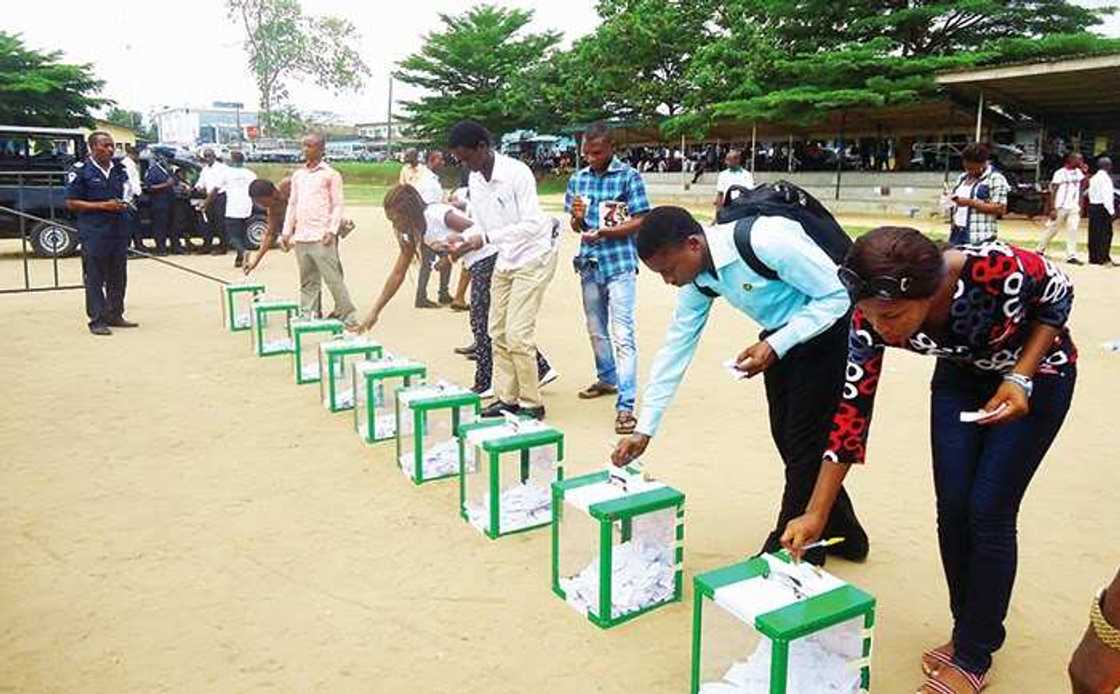Electoral Participation As First Steps Towards Addressing Challenges of Nigerian Youths, By Chidinma Ogu
Editor's note: In this piece, Chidinma Ogu spotlighted some plausible instances of why there is a need for Nigerian youths to take the 2023 general elections seriously as against previous general election.
Data from the Independent National Electoral Commission (INEC) shows that, for the 2019 general election, youth between 18 -35 years made up 51.11% of registered voters, a number that cannot be neglected.
However, an election is beyond the number of registered voters because, in the end, the outcome of an election is subject to the decision of those who turn out to vote. They drive the narratives and address societal issues by choosing who they believe can move the nation forward.

Source: Facebook
Nigerian youths are currently faced with a myriad of problems, some quite existential. So why are young people not voting? Could it be that they believe running away from Nigeria is the solution? Are they afraid of the powers that be? Could it be that young people have lost hope in the possibility of redeeming our country? So many questions begging for answers.
The reality of today remains that Nigerian youths face a number of challenges, including poverty, educational barriers, limited employment prospects and opportunities, and a lack of an enabling environment for ideas to truly thrive.
Worst of all, the voices of young people are suppressed, and they are negatively defined and denied their rights by actors who should otherwise protect them. Interestingly, these “leaders” are chosen and their contracts renewed every four years in a general election.
We are in that season again, another period to make a choice on who gets into contract with the youth for the next four years. The 2023 election presents a huge opportunity for the youth, whose data has shown make up a huge percentage of the Nigerian population.
The trend in continuous voter registration indicates that young voters may exceed the 2019 percentage of young voters. We are looking at more than half of the population of voters in Nigeria being youths. This is an advantage every Nigerian youth should take seriously and act upon.
For the government to respond to the needs of young people and guarantee that their basic human rights are recognized and enforced, it is of crucial importance that young people participate actively and meaningfully in the democratic processes of our country.
It is important that young people participate in politics either as voters or candidates in order to make a long-term difference. Youths have a say in shaping today and tomorrow's politics by voting in the upcoming elections. It is also critical for the development of policies that address the specific needs of youth in order to build a stable and peaceful society.
People under the age of 35 are underrepresented in elective positions in Nigeria today. There are 991 seats in the state house of assembly, but only 89 are occupied by people aged 35 and below, while there are 469 seats in the National Assembly, but only 12 are occupied by people aged 35 and below.
For young women, the situation is even worse and more difficult. There is a chance to change the narrative if only young people participate in elections by voting and voting right.
Nigerian youths should take a cue from the experience of Zambia. It is reported by Mundia Situmbeko that on August 12th, 2021, young people across Zambia made sure their voices were heard in a national election that saw record-breaking numbers of youth turnout to vote.
Opposition leader Hakainde Hichilema was declared the winner, defeating the incumbent, President Edgar Lungu, in a landslide victory by over 1 million votes, with over half of those votes coming from people under 35.
Interestingly, in addition to using their voices on social media, young people aged 34 and younger made up 54% of registered voters and turned out in large numbers to vote, with a 70.6% total voter turnout.
This was possible because of the resilience of the youth who turned out to vote despite challenges throughout the voting process. The election taught the leaders of Zambia that young people possess enormous power in the politics of countries in Africa and can actually revive democracy in Africa.
The 'End SARS’ protest showed that young people have the ability to effect change. The protest that forced authorities to disband the special anti-robbery squad (SARS) was led by young people.
The protest that taught young people about the power of unity. Similarly, youth participation in the upcoming elections will set the ball rolling to ensure that the needs of the youth are addressed in the choice of leaders to be voted for.
As of Monday, July 4th, 2022, according to INEC's most recent CVR Update, young people account for the largest proportion of registrants (6,698,446 young people are currently registered to vote). The issue is that this number does not actually show up on election day because a large portion of registered voters do not vote.
As part of Yiaga Africa and the UNDP’s #SixtyPercentOfUs project, initiatives are being implemented to increase youth participation in the upcoming elections by 60%.
One such initiative is the Power of 18, under which grants totaling 15 million naira were given to 15 young people from 15 states with the lowest CVR registration in order to mobilize at least 5,000 people per state to register, collect their PVCs, and vote in the 2023 elections.
Furthermore, the efforts of Yiaga Africa and the European Union, in partnership with INEC, saw the registration of over 28,000 Nigerians. This was done in the space of two weeks in Lagos and Abuja under the Youth Vote Count 2.0 project.
These initiatives have demonstrated the interest of the youth in participating in the upcoming elections. On election day, it is hoped that young people will actually turn out in large numbers to vote as a result of their apparent interest.
As long as young people believe their votes are worthless, politicians will lose interest in responding to their needs if they believe that young people will not assert the power in their numbers during elections. They will not work hard to win the votes of the youths. The ongoing ASUU strike, which has left Nigerian youths on the losing end, is a good example.
We must remember that by refusing to vote in elections, we contribute to the problem. Young people can still register in the ongoing continuous voter registration exercise. Other processes like transfer of voter registration, replacement of lost/damaged voters card, and updating voter information can still be done on the INEC online portal. Nigerian youth should register right away to get their voter's cards ready for the election rather than wait. Participation of young people in the upcoming elections will benefit a vibrant and resilient democracy in Nigeria.
"Our political leaders will know our priorities only if we tell them, again and again, and if those priorities begin to show up in the polls," writes Peggy Noonan, an American author. Arise, Nigerian Youths! and take your place in Project Nigeria.
Disclaimer: The views and opinions expressed here are those of the author and do not necessarily reflect the official policy or position of Legit.ng.
Your own opinion articles are welcome at info@corp.legit.ng— drop an email telling us what you want to write about and why. More details in Legit.ng’s step-by-step guide for guest contributors.
Contact us if you have any feedback, suggestions, complaints, or compliments.
Source: Legit.ng


